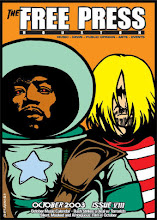John Adams

On three DVDs the miniseries John Adams will complete any exhaustive need to ruminate on American history. The impressive portrayals by all involved - Paul Giamatti, Laura Linney, Stephen Dillane, Tom Wilkinson among others - gives the whole affair a vital momentum that lasts over its 7 hours. That the biopic eclipses typical network movies or Discovery Channel specials is a given, however even based on a Pulitzer Prize winning book the filmmakers change dates and use composite characters. My personal gripe concerns some obvious make-up gaffes. Visible grease pencil lines in a high school play would be okay, but in an expensive and expansive biopic, not so much. But that's a small thing really if not indicative of the enormity of the project: the series was shot over six months and in two countries (Hungary studios doubling for Dutch, British and French locations).
The series is based on David McCullogh's 2001 biography, John Adams and makes drama out of the minutia of colonial life. Special attention is drawn by the cinematography with its modern take on historicity. The shots are replete with handheld action, dutch tilts and occasional special effects (buildings and landscapes). This gives John Adams a reality show tone, but its quiet insistence on the underside of the American revolution counters the series from overusing the style.
Massacres of civilians, court banter, secret meetings of landowners, revolution, diplomacy, cancer, politics all intertwine throughout the drama. The story will advance any number of years between episodes and that pace feels natural because the real arc are the relations over nearly a half century between John and Abigail Adams (Giamatti and Linney, who also played opposite each other in The Nanny Diaries) and Thomas Jefferson (Dillane).
Perhaps not totally coincidentally, I attended a Ben Franklin exhibit two years ago (at the Houston Museum of Natural History) and one of the interactive displays had an actor reading from Franklin's diary. The bit was about how Franklin and Adams were spending the night together and sharing a bed. One wants the window open, the other doesn't. In episode three we witness Adams being swept aside by Franklin's predetermined negotiations. Giamatti really captures the smug expression leaving Adam's face as he's politely insulted by French high society. Campaigning for aid for the American Revolution from the Dutch comes back to haunt him in a future ep. While Adams secures the foreign coin after the American victory in 1781, because he was abroad during much of the lengthy war this fact is used as ammunition by political enemies (firing blanks?) during his one and only term as president.
Depictions of life are so realistic to the point that an operation to remove a tumor using 18th century technology makes for a most wrenching scene. There's always a sense of whatever room or structure the characters are in, a kind of wooden environment. The series consistently echos the hardships and joys of the simpler life. After all, both Jefferson and Adams died (most of the other founders were long gone) on July 4, 1826, the 50th anniversary of the declaration of freedom from Britain. Only in that era communication was pretty much limited to how fast you rode a horse.
It's worth noting that the Adams family was adamantly against slavery and that he alone of the early presidents was the only non-slave owner. Cool extras include a feature that allows you to watch each episode with a bubble pop-up that delineates background info and history. Another feature documents McCullough on the process of writing. At one point he gives the viewers a tour of a Philly landmark, walking a narrow staircase to emerge on the roof. You can well imagine you are seeing somewhat the view Adams gazed at back in the day.









0 Comments:
Post a Comment
<< Home